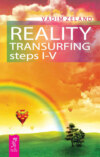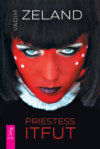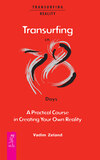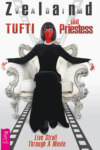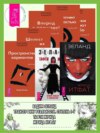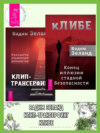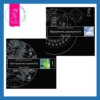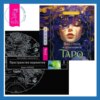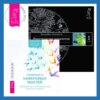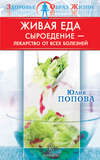Loe raamatut: «Reality Transurfing: steps 1-5»
Дорогой читатель!

Искренне признателен, что Вы взяли в руки книгу нашего издательства.
Наш замечательный коллектив с большим вниманием выбирает и готовит рукописи. Они вдохновляют человека на заботливое отношение к своей жизни, жизни близких и нашей любимой Родины. Наша духовная культура берёт начало в глубине тысячелетий. Её основа – свобода, любовь и сострадание. Суровые климатические условия и большие пространства России рождают смелых людей с чуткой душой – это идеал русского человека. Будем рады, если наши книги помогут Вам стать таким человеком и укрепят Ваши добродетели.
Мы верим, что духовное стремление является прочным основанием для полноценной жизни и способно проявиться в любой области человеческой деятельности. Это может быть семья и воспитание детей, наука и культура, искусство и религиозная деятельность, предпринимательство и государственное управление. Возрождайте свет души в себе, поддерживайте его в других. Именно это усилие создаёт новые возможности, вдохновляет нас на заботу о ближних, способствуют росту как личного, так и общественного благополучия.
Искренне Ваш,Владелец Издательской группы «Весь»Пётр Лисовский

Foreword
DEAR READER,
Everyone wants their life to be comfortable, abundant, free of illness and chaos, and yet we often find that life has its own plans, and can leave us feeling like a little paper boat spinning round on life’s turbulent waters. You may have tried all sorts of popular methods aimed at achieving happiness but I wonder how effective you found them if they conformed to the traditional worldview.
This book introduces many strange and wonderful things. It is all so mind-blowing you might not want to believe it. But you will not have to believe. The methods introduced here invite you to test everything out for yourself and when you do, your current worldview will crumble.
Transurfing is a powerful technique aimed at giving you the power to create aspects of your life in a way that would ordinarily seem impossible; In particular, Transurfing will give you the power to control your own destiny as you see fit. I promise no miracles and yet something greater than a miracle awaits you. You will discover that the hidden quality of reality is more extraordinary than any mystic tradition.
There are many books available now on how to become successful, rich and happy. It is a tempting prospect, for who would not want these things? The problem is that when you start reading these self-help books you discover that in order for the technique to work you have to do certain exercises, embark on some serious soul searching, meditate, and straight away, your enthusiasm wanes. For most people life is busy and stressful enough without having to add to the workload by giving yourself any more to do.
The books will tell you that you are imperfect and that change will have to start with yourself otherwise there is no point in hoping for anything more. You might not be entirely satisfied with yourself but deep down you know that you do not really want to change and neither should you have to. Be careful of anyone who tells you that you are less than perfect, for how could anyone else possibly know how you are meant to be? If you are told that you must change yourself in order to achieve the things you want in life the solution is not where you were looking for it.
The main idea of Transurfing is based on the existence of the alternatives space which stores the scripts of all possible events. The number of alternatives is infinite just like the number of possible points on a coordinate graph is infinite. In the alternatives space is written everything that was, is, or ever will be. Under certain conditions, a person’s thought energy can materialise a given sector of the alternatives space.
A potential alternative is embodied in physical reality like a reflection in the mirror of alternatives. The individual is capable of shaping their own reality as long as they observe certain rules. The mind tries unsuccessfully to influence the reflection. Instead you have to change the image that is being reflected.
In this book we are not going to do exercises, meditate or obsess with the self. Transurfing is not so much a new method of self-improvement as a fundamentally different way of thinking and behaving in order to get what you desire out of life. It implies exactly this—to get what you desire from life, rather than having to fight for it. The method of Transurfing is not aimed at changing the self. It offers a way of returning to self.
We all make mistakes in life and then think how wonderful it would be if we could turn back the clock and put everything right. I am not promising you a “train ticket back to your childhood”, but mistakes can be put right and doing so is a bit like returning to the past, or even stepping ‘forward into the past’. The meaning of these words will become clearer towards the end of the book. You will not have heard or read anywhere else the things I am going to tell you here, so be prepared for the unexpected as enjoyable as it is surprising.
Chapter I. The Alternatives Model
Dreams Don’t Come True

The Rustle of the Morning Stars
I was woken by the neighbour’s dog barking. The nasty animal was always waking me up. How I hated it! Why should I have to be woken up by the noise of someone else’s pet? I decided to go out for a walk, calm down and distract myself from the intense desire to set fire to my neighbour’s house. They say dogs are like their owners. This one was. There always seemed to be some idiot in my life trying to get me down. Feeling stressed I started to get dressed. My slippers had disappeared again. Where are you, you sneaky little buggers? When I find you I will chuck you out!
It was foggy and damp outside. I walked along the slippery path through the gloomy forest. Almost all the leaves had fallen, exposing the grey trunks of half-dead trees. Why do I live in the middle of this depressing bog? I reached for a cigarette. I didn’t really want one, but old habits told me I needed one. Need? At what point had I become addicted to cigarettes? It’s not very pleasant smoking in the morning on an empty stomach. I used to be a social smoker. It had been fashionable, a symbol of freedom and style. But the party ends and the grey, drizzle of everyday life sets in, bringing with it problems in patches like slimy puddles. You smoke each problem away several times as if saying to yourself: “I’ll just have this quick smoke, catch my breath and then launch myself back into the dreaded routine.”
The smoke got in my eyes making them sting, so I placed my hands over them for a minute like an upset child. I was so fed up of everything. As if reading my thoughts, a birch branch bent spitefully and hit me hard on the forehead. Bastard! In my outrage I broke the branch in half and threw it to one side. The branch got caught in a tree and bounced from side to side and sprang up and down like a jack in a box as if mocking my inability to change any aspect of my world. Feeling very low I pushed on.
Every time I tried to battle with the world it would at first yield, giving me false hope, only then to come back at me with a hard slap. It’s only in films that the hero sets off towards his goal casting aside anything and everything that stands in the way. In reality, things are a bit different. Life is like a game of roulette. You win once, twice, even three times. You imagine yourself the prize-winner with the world at your feet but always end up with less than you started. You are just the turkey fattened up to be roasted and devoured to the sounds of happy music and laughter. You were fooling yourself. It’s not your lucky day. You made a mistake…
Wallowing in dark thoughts I arrived at the beach. Sharp waves were biting viciously at the sandy shore. The cold, damp sea breeze blew at me bitterly. Fat sea gulls wandered the shoreline, lazily pecking at rotten waste. Their eyes carried a cold, black empty look as if reflecting the cold and antagonism of the world around me.
A tramp was collecting empty bottles on the beach. I wished he would disappear. I wanted to be alone but he was walking towards me, probably wanting to scrounge something. I decided to go home. Was there no peace anywhere? I was so tired. I realised that the feeling of tiredness never left me, even when I was relaxing. At some point I had started killing time as if sitting out a prison sentence. I was always waiting for things to change, for a new stage in my life to begin where I would be different and able to enjoy life, but that stage was always somewhere in the future. In the meantime it was the same old drudgery. I kept waiting but the better future remained as elusive as ever. I would return home and do the same thing I always did; eat a boring breakfast and then leave for my dull job, forcing myself to produce results which mattered to someone else but not to me. It would be just another day of the same tiresome, meaningless life.
I was woken by the rustle of the morning stars. What a sad dream. It was as if I had returned to a period in my past. Thank goodness it was only a dream. I stretched with relief just like my cat does. There he was lying lazily sprawled out—only his ears giving any sign that he was aware of my presence. Get up you whiskered thing. Are you coming with me for a walk? I had placed an order for a sunny day and so set off towards the sea.
The path led through the forest and the rustle of the morning stars gradually faded, giving way to the multi-voiced choir of the bird nation. Someone in the bushes was trying especially hard “Food! Food!” There he was the little wretch. However can such a little ball of fluff squawk so loudly? Only now did it occur to me that although every bird had a different voice, none were ever out of tune with the rest of the choir. They always managed to produce such a graceful symphony; no orchestra, however sophisticated could be favourably compared.
The sun stretched its rays between the trees, creating a magical backlighting that highlighted the voluminous depth and richness of the colours of the forest and transforming it into one miraculous hologram. The path led me diligently towards the sea. The emerald waves exchanged whisperings with the warm sea breeze. The shore seemed endless and empty but I felt comfortable and at peace as if the overpopulated world had created a secluded corner just for me. Some people believe the world is an illusion created by the mind but I could not imagine having such a high opinion of myself that I could think all this beauty was the product of my own consciousness.
Still feeling the effect of my oppressive dream I began to reminisce about my former life, which had actually been as dull and gloomy as my dream. Like a lot of people, I had often demanded that the world give me all I felt it owed me but in response it had turned its back on me in indifference. I was advised by others wiser and more experienced than myself not to give up because the world doesn’t give up that easily either. “You have to fight for what you want”. So I tried battling with the world but I didn’t get anywhere and ended up exhausted. My advisers had a ready answer for this too. “You are the problem. Change yourself before you start demanding things of life”. So, I battled with myself but this turned out to be even harder than battling with the world.
Then one day, I dreamed that I was in a nature reserve. In the dream I was surrounded by indescribable beauty. I was walking through the reserve and admiring the full wonder of it all when I came across an angry old man with a grey beard who, as far as I could make out, was the Guardian of the Reserve. He watched me in silence. I walked up to him but as soon as I opened my mouth to speak he cut across me. In a cold tone he said that he didn’t want to hear a word; he was tired of noisy and capricious visitors who were constantly displeased, always making demands and left mountains of rubbish after themselves. I nodded in sympathy and walked on.
I was amazed by the unique beauty of the reserve and wondered why I hadn’t visited it before. Enchanted, I continued to wander around taking in the magnificence on all sides. No words could fully describe the perfection of the landscape. My mind went blank in stunned admiration.
Soon the Guardian appeared before me again. The austere look on his face had softened and he beckoned for me to follow. We climbed to the top of a green hill and from there the spectacular view of a picturesque valley opened before us. I could make out some kind of village with toy houses decorated with plants and flowers like an illustration in a book of fairy-tales. Had the scene before me appeared more real I could have stood regarding it with delight for some time. As it was, I started to suspect that such fabulous beauty was the stuff of dreams and not real life. I turned to the Guardian with a questioning look but he just sneered into his beard as if to say: “We’re only just getting started!”
As we descended into the valley below it began to dawn on me that I could not remember how I had arrived at the reserve. I was hoping the old man could give me an explanation. Then I must have made some clumsy remark about how it must feel pretty damn good to be one of the lucky ones who could afford to live in such a beautiful place, to which, openly displaying his irritation, the Guardian replied: “Who is stopping you from joining them?”
I started to go on about how not everyone was born rich and we don’t choose our fate. The Guardian ignored my words and said: “That’s the point. Everyone is free to choose any destiny they wish. The only freedom we truly have is the freedom of choice. You can choose anything you want.”
His statement did not at all fit with my philosophy of life and I made to argue with him, but the Guardian would not listen: “Fool!” he said. “You have the right to choose, but you don’t exercise it. You do not even understand what ‘to choose’ really means.” This is ridiculous, I thought. What does he mean by, “I can choose whatever I want”? Anyone would think that you could just conjure up anything you wanted. At that moment I suddenly realised that I was dreaming. The situation threw me and I did not know how to behave.
As far as I can recollect I hinted to the old man that he could chose to speak rubbish whether in a dream or in waking but there ended the extent of his freedom. My comment did not seem to bother the Guardian at all; in fact he laughed in response. Aware of how ridiculous the situation was (what was the point of getting into a debate with a figure from my own dream?) I was considering whether it would be better to wake myself up. As if reading my mind the old man said: “That’s enough. We don’t have much time. I hadn’t expected them to send me a moron like you, but I must carry on with my mission nonetheless.”
I was going to ask him what his ‘mission’ was, and who ‘they’ were but he ignored me, instead giving me a riddle, which at the time seemed quite absurd: “Everyone can have the freedom to choose whatever they want; but here’s a riddle for you: how do you acquire that freedom? When you guess the answer correctly your apples will fall to the sky.”
What apples? I was beginning to lose patience and said that I had no intention of solving any riddles. Miracles only happened in dreams and fairy-tales. In reality, apples generally fall to the ground, to which he replied: “That’s enough! Let’s go. There is something I must show you.”
Regrettably, when I woke up I could not remember the end of the dream. However, I did have the distinct feeling that although I was unable to express it consciously, the Guardian had imparted some kind of information to me. Just one word seeped through into my mind but I had no idea what it meant: Transurfing. The thought I found going round my mind was that I did not have to totally furnish my world myself; that everything that was to be mine had been created long ago without my participation but for my own well-being. There was absolutely no point in battling with the world for a place under the sun, and no-one was stopping me from simply choosing the life I wanted to have.
At first the idea seemed absurd. I would probably have forgotten all about it if I had not to my amazement soon afterwards started having very clear recollections of what the Guardian meant by the word ‘choose’, and how to actually make a choice. The answer to the Guardian’s riddle came to me of its own accord; as knowledge does sometimes seem to come from nowhere. Every day I learned something new and each time I felt huge surprise, sometimes bordering on fear. I can give no rational explanation of how this knowledge came to me but of one thing I am certain. I could never have made it up myself.
Ever since I discovered Transurfing (or rather, since I was given it to discover) my life has been filled with joyful meaning. Anyone who has ever been involved in some kind of creative work will know the happiness and fulfilment that comes with creating something with your own hands. Imagine then the feeling of creating your own destiny. Even the expression ‘to create your own destiny’ as it is interpreted in its usual sense, fails to describe what I mean here. Transurfing is a method that frees you to choose your own destiny, literally like you would choose something in a supermarket. I want to share this with you so that you can understand why ‘apples fall to the sky’, why the ‘morning stars rustle’, and many other curious things.
The Guardian’S Riddle
There are different interpretations of the nature of fate. One interpretation is that fate is your lot in life, something predetermined and which however hard you try, you can never escape. This definition is rather limiting as it suggests that if a rough lot has befallen you in life there is no hope of anything ever getting any better. Despite this, there will always be those who willingly accept this definition of fate because it is convenient. They would rather life be reliable and the future more or less predictable than live with the fear of uncertainty.
Nonetheless, the total inevitability implied by this interpretation of fate leaves one feeling dissatisfied and even a little resentful. People who are deprived of good luck lament their fate and naturally question why life is so unfair. Why is it that some people have more than they could ever desire, while others never seem to have enough? Why is it that things come easily to some, while others never achieve results however hard they try? Some people are endowed with natural beauty, intellect and strength, while others seem to have an inferior goods label stuck to their forehead for their entire life as if paying for some kind of previously committed sin. Why does such inequality exist? Why does life in its endless diversity place limits on certain groups of people and where exactly did those less lucky go wrong?
People often feel hurt and indignant when they realize they are less fortunate than others and they search for an explanation for their circumstances. This is when many people turn to teachings that support ideas such as karma and retribution for sins committed in previous lives. One would think that all the Lord our God had to do with his time was discipline his naughty children and that despite his omnipotence he evidently struggles with the parenting side of things, putting off the punishment of retribution until a later date. One wonders what the point could be of punishing a person for something they do not actually remember doing.
Another popular explanation for inequality spreads the false hope that those who suffer and live their lives in need will later receive generous compensation, although it is not clear whether good fortune awaits them in heaven or in a future life. Whatever the arrangement, explanations like these can never leave one fully satisfied. Whether past and future lives exist or not is also of little significance. You can only be aware of the life you are living now and so in this sense, it is the only one you have.
If you believe that your fate is predetermined then the best remedy for the despondence you may feel is acceptance. There will always be people around to give you good advice like, “If you want to be happy just be happy! Be optimistic; be satisfied with what you have.” There will always be someone to tell you that the cause of your unhappiness is your own constant complaining and unrealistic expectations of life and that you could be happy by definition if you would simply reconnect with your inner joie de vivre. You might half-heartedly agree whilst at the same time awkwardly acknowledging how uninspired you really feel about greeting your dull life with new-found joy. Surely we have the right to expect more. Why should we have to force ourselves to be happy when it is as futile as trying to force yourself to love someone?
Then there are the “enlightened” individuals preaching universal love and forgiveness. Their world is like a blanket of illusion that you can pull up over your head to protect yourself from encountering the severity of life head on, and everything does get a little easier as a result. Deep down however, it is still difficult to comprehend why you should forgive those you hate and love those you have no genuine feeling for. What good is happiness if it is faked? Surely happiness should come naturally rather than being squeezed from the soul like the last drop of toothpaste from a tube.
There are others who refuse to believe that life is boring and primitive enough to be reduced to predetermined fate. This type of person would rather be satisfied with what they have managed to achieve by their own abilities than accept the lot they have been dealt. This is a different perception of fate whereby you make your own luck and good luck has to be fought for. That is just how it is. Wise people will tell you that life is not given to anyone on a plate and that if you are not satisfied with what you have, you must dig your heels in and work hard to attain the happiness you want.
The history books describe brave heroes who fought and laboured day and night, overcoming unimaginable obstacles. The victors were rewarded with the laurels of success but only after suffering all the burdens and privations of battle. This take on fate is not very logical either. Millions of people battle and labour but true success comes to but a few. You can spend your entire life struggling desperately for a place under the sun and yet get nowhere. Why would life be so cruel and unyielding?
What a heavy burden it is to have to battle with the world to get what you want and if the world does not respond, to have to battle with yourself. How hard it is to believe that if you are poor, ill, ugly or unlucky it is your own fault; that you are flawed and so must change. These ideas suggest that you are an accumulation of various shortcomings and defects which must be worked on. Unless you are lucky enough to be born rich and happy, your lot in life is either to humbly bear your own cross or dedicate your entire life to fighting against it. It is somehow not a view of life that readily fills the heart with joy. Surely, there is a glimmer of hope among these dismal beliefs.
Fortunately, there is a glimmer of hope that comes from a totally different view of things. The solution is as simple as it is enjoyable in contrast to the other views described above. In Transurfing the concept of fate is based on an alternative model of the universe. Before you wave your hand in disappointment and decide that you are being fed yet another chimera, remember, that every known concept of fate originates from a specific worldview, which in turn, is based on a number of unproven principles.
For example, materialism is founded on the proposition that matter is primary and consciousness is secondary. Idealism claims the opposite. Neither of these philosophies has been proven, and yet models of the universe are constructed around both. Each model is convincing enough and has its loyal defenders. Both materialism and idealism explain the phenomenon of the world via philosophy, science and religion, and both are right and both are wrong in their own ways. Man will never be able to describe absolute truth with total accuracy because the notions used in our attempts to describe the truth are of themselves relative. There is a well known parable about three blind men who describe an elephant by studying it with their hands. The first blind man touches the elephant’s trunk; the second touches the leg, and the third touches ear. Each draws conclusions about what kind of animal the elephant represents based on their own findings. It would be pointless to try and prove that only one description of the three is correct. What is important is that the description be relevant and applicable.
You have no doubt heard the idea expressed that reality is an illusion created by the mind, but no one has explained in detail where the illusion comes from.
Does it mean that we are all in a sense watching a film? Of course, it is highly unlikely that a concrete, rational substantiation of this idea will ever be upheld. Others hold the opposite opinion that the material world is simply a mechanism which functions according to its own immutable laws and cannot be governed by human consciousness. There is surely an irrefutable grain of truth in this idea.
The human mind likes to have its feet on solid ground free of ambiguity and so for centuries scholars have been tearing one theory to pieces in favour of another which is then placed high on a pedestal. After every fight on the intellectual battlefield for truth just one fact remains undefeated: every theory represents a separate aspect of the phenomenon of a multi-faceted reality.
Each theory that stands the test of time has its place for they all represent one aspect of reality. If you decide that fate is something predestined that you cannot personally change, then this is how it will be. In effect you are voluntarily giving yourself to the will of others, becoming like a small boat floating at the mercy of the waves. If however, you decide that you can create your own destiny then you will consciously take responsibility for everything that happens in your life, battling against the waves in an attempt to sail your little boat. You may have noticed that whatever you choose is always manifested. What you choose is what you get. Whatever worldview you choose to believe in, the truth of that worldview will always be on your side and others will argue with you because they too are right.
Any aspect of reality can be taken as a starting point and subsequently developed into a whole field of knowledge and it will have logical consistency and successfully reflect one manifestation of reality. An entire field of knowledge can be substantiated by just one fact which although not fully understood, has its place.
For example, quantum physics is based on a number of unproven truths and postulates which cannot be proven because they serve as the basic starting point for a given field of knowledge. In quantum physics a microcosm sometimes acts as a particle and sometimes as a wave. Unable to provide an unambiguous explanation for such dualism, scientists took the phenomenon to be an axiom. The postulates of quantum physics bring together different aspects of reality in all its diversity of form, just like the blind men in the parable in one case proclaimed that the elephant functions like a stump and in another, like a snake.
If in describing the microcosm one chooses to start with its particle quality as fundamental then one arrives at the model of the atom created by the famous physicist Neils Bohr. In the Bohr Model the electrons rotate around the nucleus like the planets in the solar system. If on the other hand, one takes the main quality to be the wave then the model of the atom will look like a blurry dot. Both models work reflecting different manifestations of reality. In this case too, one could say that the scientists get what they choose.
Any manifestation of reality can serve as a postulate, or the basis for an argument which will undoubtedly make sense and have its place. In search of truth people have always striven to understand the nature of the world, studying its individual parts. Bodies of scientific knowledge were created to describe and explain the various phenomenon of nature and often they contradict each other.
The nature of the world is one but it reveals itself to us in many guises. As soon as one face has been studied and explained another appears that does not fully correspond to the first. Scientists have attempted to overcome these contradictions by encompassing the diverse manifestations of reality in a single model of the universe, but this is no easy task. There is one irrefutable fact that unites and reconciles all branches of knowledge and that is the diverse and multifaceted nature of reality. Variability is the world’s most fundamental quality.
For some reason, the defenders of different fields of knowledge disregard this fact in their attempts to describe individual phenomenon, despite the fact that there is so much that could be learned from it. Variability is a key reference point, just like zero is the main reference point on a coordinate grid. Any starting point for a particular area of knowledge is secondary in relation to this key reference point of variability and yet it is bypassed as if it held no information. Nonetheless, it does carry information and information of quite an extraordinary nature.
To solve the Guardian’s riddle we will take the quality of variability as a starting point. In other words, we will take as a postulate the fact that reality manifests itself in an infinite variety of forms. Despite the very general nature of this postulate it reveals quite fascinating knowledge.
